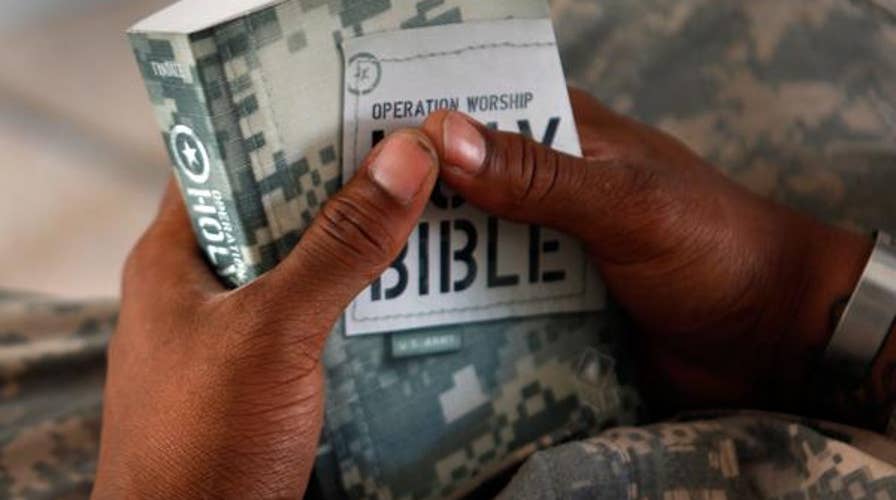What is the future of religious liberty in the military?
Spirited Debate: Christopher Hale and Robert Jeffress discuss how The Supreme Court declined to hear a former Marine's case this week in which she was court-martialed in part for refusing to remove a bible verse from her workstation
Attacks on religious freedom in the U.S. have more than doubled in the last six years, according to a recently released report.
Last year saw more than 1,400 acts of hostility against religious expression, up from 600 documented in 2011, said the report, published by the First Liberty Institute, a conservative organization that advocates for the First Amendment and provides legal services.
Attacks are occurring in a variety of arenas, chief among them public places, schools, churches and the military, the report noted.
“Quantitatively and qualitatively, the hostility is undeniable,” the report said. “And it is dangerous.”
“This past year has seen the continuation of high-profile attacks on religious liberty in the public arena as people of faith have been fired, refused employment, or fined for practicing their faith or speaking out about their religious beliefs,” it continued.
The report noted that the number of attacks is likely much higher than what has been documented.
“What we collect is just what's published. So really it is just the tip of the iceberg because what's published is really a fraction of what is actually happening," First Liberty CEO Kelly Shackelford said during a conference call with reporters earlier this month.
"Most people just take it,” he said. “They don't call. They don't know there is a place they can get help. They don't have enough money to hire a legal team.”
As an example of hostility in public places, the report cites three instances in which state legislatures came under court challenges for opening their assemblies with prayers. First Liberty provided legal representation in some such cases.
In hostility toward religious expression in schools, the report referred to a case in which a high school junior varsity coach was fired in 2015 for praying after a football game. The coach sued the school district, seeking to be rehired. But in August, he lost the suit when the Ninth Circuit Court of Appeals denied him an injunction that would have let him return to his job.
The judges ruled that the high school junior varsity coach, Kennedy, was not engaging in a solitary act of praying, but was kneeling and praying on the 50-yard line after the game ended and while students and parents still were in the stadium.
“Kennedy was offered (and, for a time, accepted) an accommodation permitting him to pray on the fifty-yard line after the stadium had emptied and students had been released to the custody of their parents,” a judge wrote, according to published reports. “His refusal of that accommodation indicates that it is essential that his speech be delivered in the presence of students and spectators. Second, for the same reason, the 'speech at issue' is directed at least in part to the students and surrounding spectators; it is not solely speech directed to God.”
In an example of hostility in the military, the report recounted an instance in which a navy chaplain was in danger of losing his job when he gave religious views regarding extramarital sex while he was counseling someone. First Liberty Institute says it defended the chaplain and succeeded in getting charges against him dropped.
“As more and more Americans become aware of the growing attacks on religious liberty and learn about what their rights are,” the report said. “They can stand and turn back the tides of secularism and hostility that have so eroded religious liberty — America’s first freedom.”










































